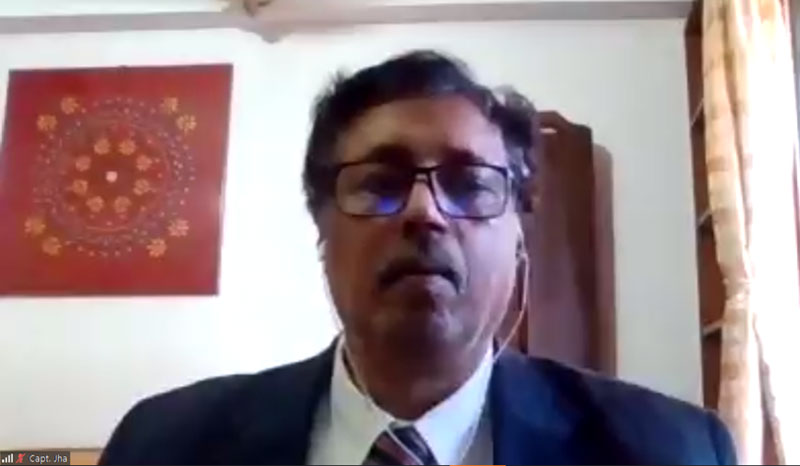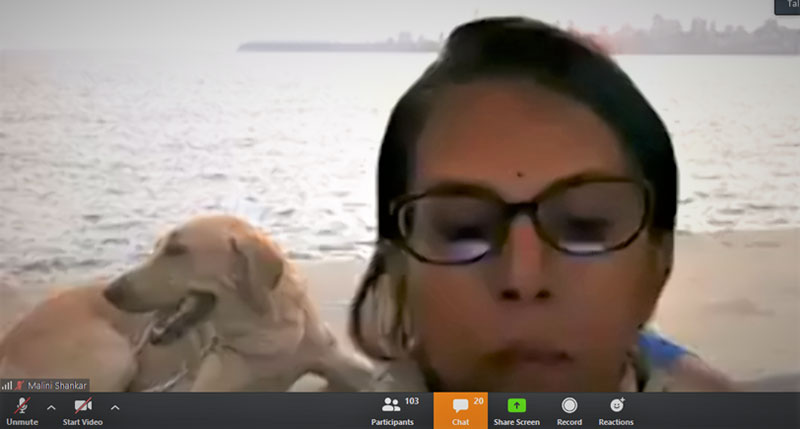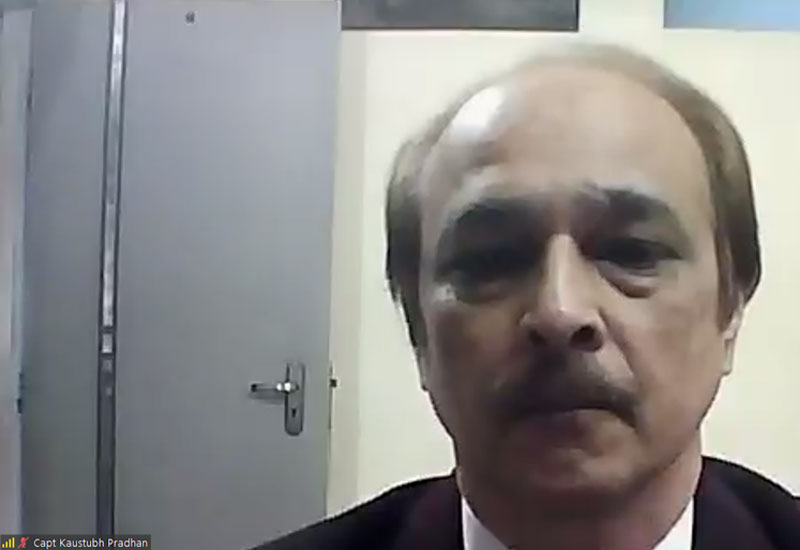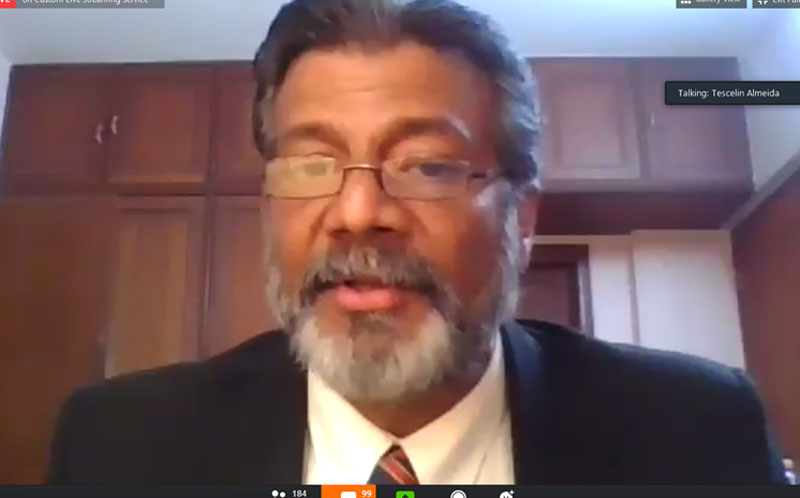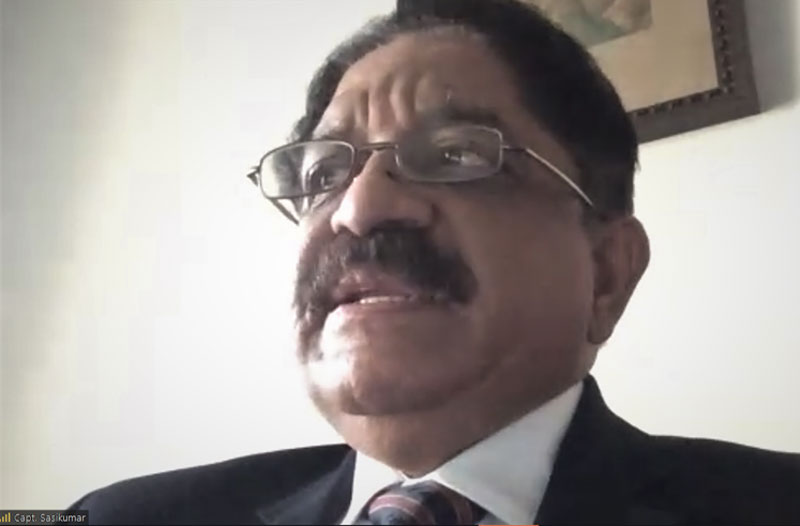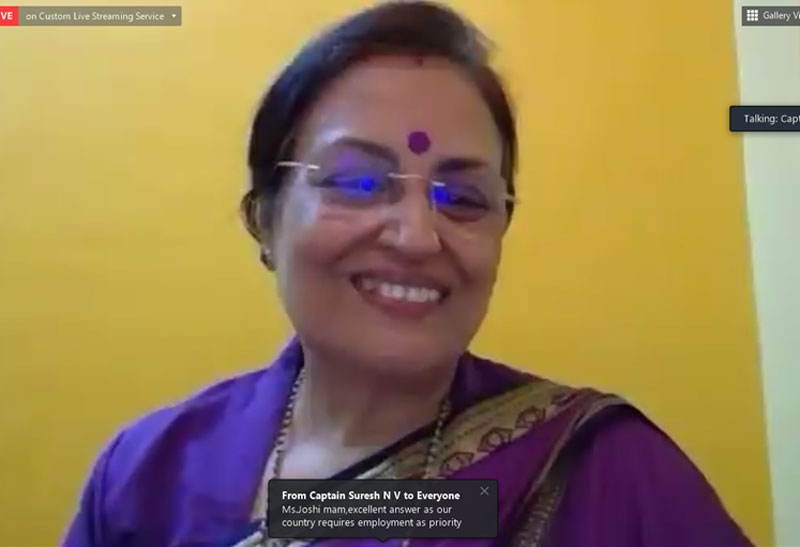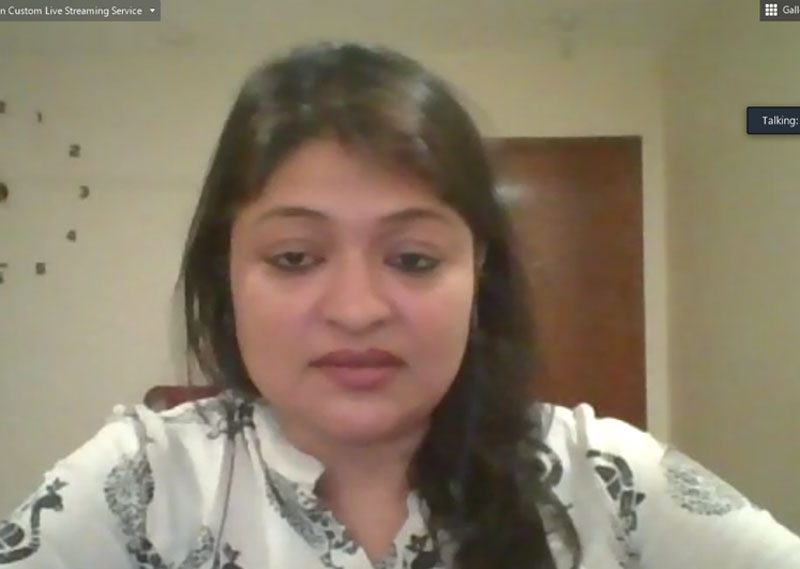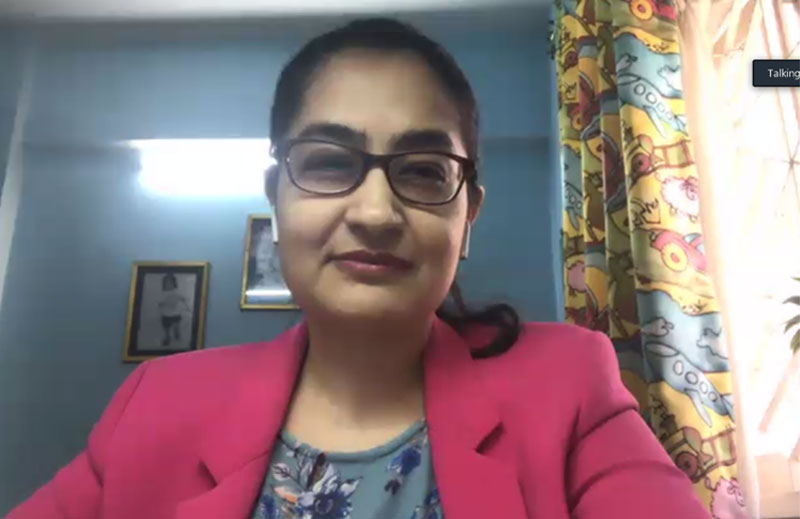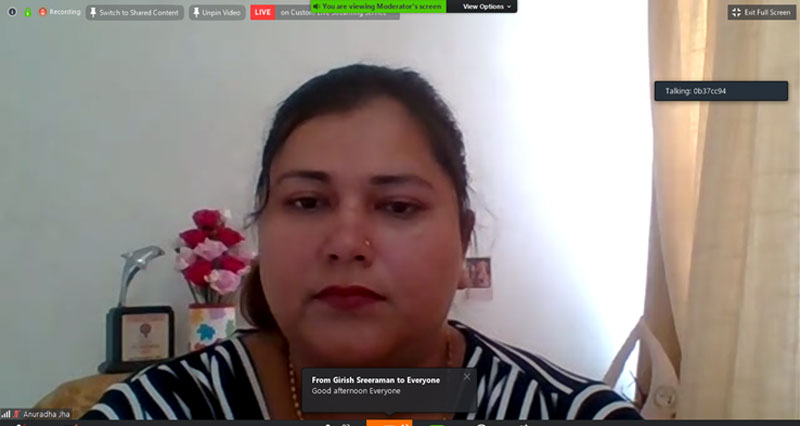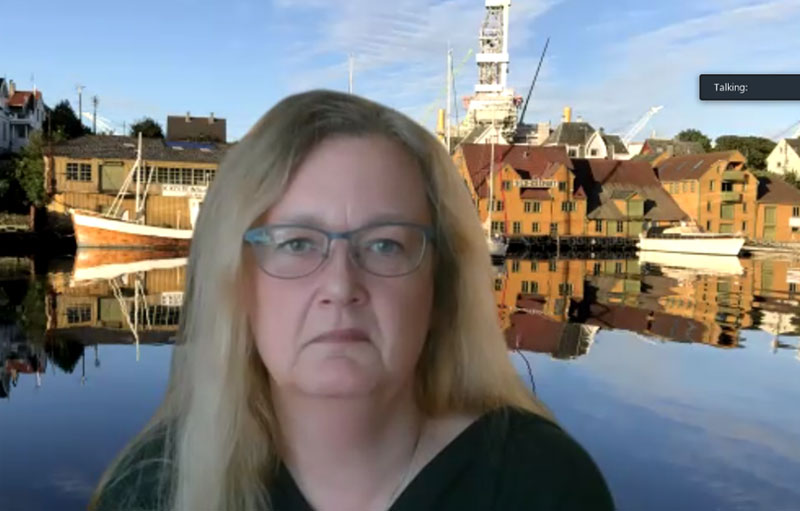Events
CMMI WEBINAR -03 ON "SHIPPING - WOMEN SPEAK"
FIRST AMONG WOMEN IN MARITIME INDUSTRY ADDRESS CMMI'S-03 WEBINAR
The Company of Master Mariners of India (CMMI) presented a webinar -03 on "Shipping - Women Speak " on the subject - "Human factors - Perspective on Autonomous Ships". Capt B. K. Jha, the master Company of Master Mariners of India welcomed the members and all the guests on the CMMI-03 of the Webinar.
Capt M.P. Bhasin the Secretary General introduced eminent speakers Dr. Malini Shankar IAS, the first woman, Director General of Shipping and the National Shipping Board (NSB) Chairperson, Ms. H. K. Joshi, the first Woman Chairperson and Managing Director of The Shipping Corporation of India, Ms. Sanjam Shahi Gupta, first President Emeritus, WISTA India, Ms. Sonali Banerjee, Senior Surveyor, IRS, first Indian woman Marine Engineer. Capt. Anuradha Jha was the Master of this Webinar. Capt. Tecslin Almedia, the Warden introduced the keynote speaker, Dr. Capt. Margareta Lutzhoft, Professor in the Marsafe Group, Western Norway University of Applied Sciences, Norway she is a Master Mariner and one of the world's leading researcher in Nautical Sciences.
Capt. B.K. Jha, Master, CMMI gave brief about Autonomous ships stating it helps in weeding out inefficient tasks and enables to focus resources on critical, innovative and creative tasks. Automation is essential for survival of any industry in this age and time. As far as seafarers are concerned I have two concerns; create new jobs and new opportunities for the people. My second concern is to unskilled and upskill the workforce or the seafarers. The question is are we doing that.
Dr. Malini Shankar, NSB Chairperson, said Tesla not so long ago announced introduction of driverless cars. In 2015 The Guardian predicted that by 2020 people will travel as backseat drivers. However, the only remote control we have seen is we are all remotely controlling each other through virtual Media. In 2019 IMO has announced guidelines for autonomous ships. You all recognise that 75% to 96% of all accidents are caused by human error. The question is will the Autonomous and semi-autonomous ships avoid accidents caused by the human judgment and fatigue and make our oceans safer.
She shared about an article in Science magazine that outlined the advantages and the concerns of using autonomous vessels.
Speaking about advantages she said the ships could be lighter because it carries less crew and more cargo. This would increase revenue and increase fuel efficiency. It would also leads to reduction and emission because of the design of the automated ships. As far as the human beings are concerned it would eliminate sea sickness. There would be no damage to human body, which otherwise is exposed to very harsh climatic conditions.
The study is based on comparisons of remote operations in other sectors such as aviation, cars, and space operations. If we think the crew is overloaded with much documentation and information autonomous ships would only multiply this overload.
Second important thing the article delineates is boredom. The article infers it could be worse when trying to manage and manoeuvre an autonomous ship from distance. They also felt that there could be mishaps during the handover due to lack of feel of the vessel. I think every Captain who has steered a vessel knows what the vessel is doing by its feel even before the instrument tells it.
Another major factor is human understanding in local knowledge and object differentiation. For example how can an autonomous vessel differentiate between a help seeker and a pirate. It recommends the importance of shore control center. They become the lifeline of autonomous ships. Driverless cars run on the assumption that people cross road at zebra crossing. However, an accident occurred when a person crossed road slightly away from the zebra crossing, which the system failed to identify. The car's system reacted only one tenth of a second before the accident occurred causing death of a pedestrian. These are key factors in design of autonomous ships. You could have semi-autonomous ships with people on-board. All these pluses and minuses apply. So it takes a whole lot of engineering. Engineering can be divided in two parts, that is how it can the ship propel itself, how can it read the program itself etc. The engineering also has to take into account human factors. How does a human react? What kind of objects and their permutations can be encountered during the voyage? She concluded saying these are some of the challenges that have to be met in design of autonomous ships.
Smt. H. K. Joshi, CMD, The Shipping Corporation of India, spoke about Women and leadership in shipping. As we are aware shipping is sailing today through turbulent waters. The pandemic has only added to our woes in these times. While there has been a general observation that shipping is not affected by the pandemic as much as it has affected other industries she said we need to think about the fact that it's been over a decade the industry has been into a depression and that has substantial financial implication on the industry. So we shouldn't be restricting to the impact due to CoVid -19 she stressed. Speaking about leadership she said there very few women in leadership position. Sharing her experience she said "When I walk through the shipping house I don't see myself as a woman, but as professional there to deliver a certain specific agenda. It would benefit all if women are able to leave their gender back home once they are out and just carry themselves as professional. She gave this message for the women and general public, adding it will make their success easier.
Leadership, she said happens at all levels and is not only for women at the top. Leadership is only as successful as the team lets him or her be. She also said that leadership is actually the partnership between the leader and his or her team. Success of this partnership is visible in the results of the organisation. If you have a very good leader but not a good team then there is a problem. However, she said it's greater problem if you have a great team but not a good leader.
She took an opportunity to say that in Shipping Corporation of India today they have an excellent partnership and an excellent team. She further said "This excellent team delivered phenomenal results in 3rd quarter and even during this times of COVID-19 will be announcing 4th quarter results shortly. You will be able to assess the performance from the results. Leadership should be gender neutral however; it's the mindset, which is the problem. She urged women to disengage from their identity as women and perform as a professional.
Ms. Sanjam Shahi Gupta, President Emeritus, WISTA India reiterated Ms. H. K. Joshi's point that a good leadership is gender neutral. Constant change is happening in the maritime industry. She said in terms of participation we should let women to participate because it's proven in research that women leader will make company more profitable. When we are facing challenges we need to be responsible for the climate change and to environmental issues. Even at the time of crisis there is a lot of opportunity for women. She gave a brief about WISTA, as important organization for the women in maritime sector. She flagged the lack of data in the industries as a matter of concern. According to data we have over 800 women working onshore and 125 as seafarers and Less than 5% women rise to CEO positions. So we need to have more gender diversity programs and training. She concluded hoping the Maritime sector would include and welcome more women.
Ms. Sonali Banerjee, Senior Surveyor - IRS, First Indian Woman Marine Engineer, thanked CMMI for giving the opportunity to present the views of classification society during COVID. As we know the pandemic CoVid -19 has significant impact on shipping and ports to maintain normal ship and port functioning. It is vital that these operations continue during this crisis to maintain the essential supplies like fuel, food and so many other essentials that need to be carried to the rest of the world. Ships need to comply with international, coastal and inland waterways regulations depending on the trade pattern. Solas Convention also requires that ships are to be classed by the classification of the society not just recognized by the administration. The vessel should comply with statutory regulations at all times. Upon expiry of the ship certificate a ship can be detained, given its efficiency and will be unable to continue operating. It is also a condition of P&I cover that ships remain compliant with the regulations. We know that during normal times also shipowners and managers face challenges and have great difficulty in remaining fully compliant. But specifically when we talk about COVID - 19 times we can just imagine the difficulty for the shipowners and managers and the various ROs and flag state to work in conjunction with each other. The ROs and clients are facing the challenges to meet the clients need for proper survey due to various reasons. Surveyors are facing difficulties to carry out ship surveys due to travel restrictions and quarantine regulations. She concluded by urging audience to pray for the world to heal fast. She thanked all the seafarers who have been working for this crisis to ensure uninterrupted operation of the more essential goods and commodities away from their family. Their sacrifice cannot be unmatched.
Capt. Almeida introduced the keynote speaker Dr. Capt. Margareta Lutzhoft, Professor in the MarSafe Group, Western Norway University of Applied Sciences. Based in Norway, she is a Master Mariner and one of the world's leading researcher in Nautical Sciences.
Dr. Capt. Margareta Lutzhoft, made a presentation on a 3 year project "HUMANE project Human - centered autonomy."
She shared some important points from her research on Indian ships: She shared a picture of the Indian ship named Sarbamandira, which was used for transportation of treasure, horses and women.
HUMANE project was started as Norway was concerned that development of autonomous shipping wasn't looking at all the areas that we thought it should. The project is focusing on 4 areas now system safety and cyber security, basically the hardware and software of this innovation. The legal implications, a few years ago were not very well looked at. Skill sets knowledge and competence of which many are very interested in. Many want to know what is going on here.
Everybody is saying the technology is there. We should start using it. However, we are not convinced that this is true. We also want safe and efficient shipping. But we see that development is technology driven and not human tempered. We want to support and enable development wherever possible while taking into account human perspectives as well as technology. We stress on human centred approach to technology.
We hold Forecasting workshops where experts think about these aspects.
Answering the question about Autonomous ships being a hype or paradigm shift she said from peak of expectations we are sliding down to disillusionment. Not many shipping companies are interested in these projects. They are either being scaled down or delayed.
So why use autonomy? The first argument was it would make ships safer by reducing human error. Secondly it would reduce costs. We suspect this is not true. So now the argument is that it will be better for the environment. So if you realise that we are not safe the question is what have we done about it.
What I think is going on is that couple of large companies wanted to own the narrative.they wanted to be known as the companies that took the first steps. That they were spearheading this development. The irony is that many of them are not even working on autonomy any more. They put out nice advertisements and videos showing how the world is going to look like and today we have to live with the consequences. Of course it's about technology because technology is a very sexy than anything else. We love our engineers and think they can do anything.
But we know that automation and humans do not play together well. We know from earlier studies done in many other domains that skills deteriorate when not used over a period of time. Is automation autonomy takes over we will become inexperienced. We all know that our memory fades due to lack of use. Knowledge develops through use of feedback it is not something that we just put inside our head and it would remain there forever. It is also true that we cannot hold attention for longer than half an hour or so depending from person to person. That is the reason we do not have lectures exceeding 40 minutes. So it is humanly impossible for us to carry out the basic function of monitoring. This is the job we are designing the operators. They are not even going to be operators but rather monitors. It will be boring for monitors of the ship whether they are doing this from the shore or on the ship. Of course the person monitoring will be overloaded as there are lot of things that are happening.
Capt. Sashi Kumar the CEO of CMMI gave vote of Thanks. The webinar was very interactive and appreciated by the participant

